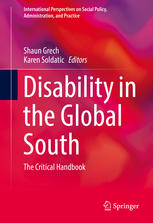

Most ebook files are in PDF format, so you can easily read them using various software such as Foxit Reader or directly on the Google Chrome browser.
Some ebook files are released by publishers in other formats such as .awz, .mobi, .epub, .fb2, etc. You may need to install specific software to read these formats on mobile/PC, such as Calibre.
Please read the tutorial at this link: https://ebookbell.com/faq
We offer FREE conversion to the popular formats you request; however, this may take some time. Therefore, right after payment, please email us, and we will try to provide the service as quickly as possible.
For some exceptional file formats or broken links (if any), please refrain from opening any disputes. Instead, email us first, and we will try to assist within a maximum of 6 hours.
EbookBell Team

4.4
92 reviewsThis first-of-its kind volume spans the breadth of disability research and practice specifically focusing on the global South. Established and emerging scholars alongside advocates adopt a critical and interdisciplinary stance to probe, challenge and shift common held social understandings of disability in established discourses, epistemologies and practices, including those in prominent areas such as global health, disability studies and international development. Motivated by decolonizing approaches, contributors carefully weave the lived and embodied experiences of disabled people, families and communities through contextual, cultural, spatial, racial, economic, identity and geopolitical complexities and heterogeneities.
Dispatches from Ghana, Lebanon, Sri Lanka, Cambodia, Venezuela among many others spotlight the complex uncertainties of modern geopolitics of coloniality; emergent forms of governance including neoliberal globalization, war and conflicts; the interstices of gender, race, ethnicity, space and religion; structural barriers to redistribution and realization of rights; and processes of disability representation. This handbook examines in rigorous depth, established practices and discourses in disability including those on development, rights, policies and practices, opening a space for critical debate on hegemonic and often unquestioned terrains.
Highlights of the coverage include: